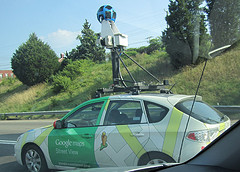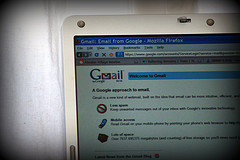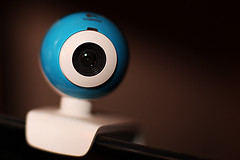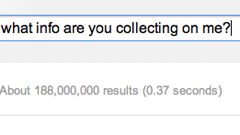Is this the start of the humans vs. machine war, where our smart devices decide they’ve had enough of sitting back and watching our species click around on TVs and swipe our phones and just revolt? Let’s hope not, but a blogger in England does think he’s figured out that LG Smart TVs are so smart, they’re actually spying on us. [More]
somebody’s watching you

Google Loses Appeal Over Street View Cars Snooping On Home Wi-Fi Connections
Google lost its appeal in federal court yesterday over whether or not its Street View cars invaded people’s privacy by collecting info through their home Wi-Fi systems as it drove through their neighborhoods. [More]

FTC: Webcam Company’s Lax Security Led To Invasions Of Privacy
It’s all fun and Internet-connected games until someone gets spied on, says the Federal Trade Commission in a recent action it’s taking to protect consumers from seemingly innocent digital devices. The Internet of Things makes it so we can be online all the time, with our appliances, vehicles and many other objects we interact with on a daily basis. But the FTC is warning customers about webcams from TRENDnet that might not be so secure. [More]

Google: Of Course We’re Going To See What’s In Emails Sent To Gmail Addresses, Don’t Be Silly
Raise your hand if you use Gmail. Now look around at your pals, who are ostensibly reading this with you and are perhaps one of 425 million Gmail users. Anyone sending email to those people apparently have no “reasonable expectation” that those communications are confidential, according to a court filing submitted by Google. [More]

London Asks Company To Stop Monitoring Foot Traffic By Tracking Smartphones Of Passers-By
You know that tingly feeling you get at the nape of your neck when it feels like someone’s watching you? Londoners might be getting that titchy touch of spy vibes just from walking past recycling bins in the city. Officials have told a company it has to stop using those bins to track the smartphones of people strolling by, because [insert whole lot of privacy concerns right here]. [More]

Clicking On Shady Links To Download Apps Is A Super Easy Way To Get Your Phone Hacked
Listen, it’s not like we’re trying to be nags, here. It’s just that it is so very easy for n’er-do-wells to hack into your private life and we want to make sure you’re safe and sound. We’re not the only ones to drive home this point, as one security expert shows with a simple hack he made that looks like an app but is really an insidious, spying piece of malware. [More]

California Bill Seeks To Give Consumers Access To All That Personal Data Companies Are Mining
We all know (or should know) by now that there’s a whole lot of information about us floating out there on the Internet. Companies like Facebook, Twitter, Google and others are busy collecting that info from data brokers and using it in ways seen and unseen. But it’s hard to put a finger on just what about you these companies have, something a new bill called the Right to Know Act is seeking to change in California. [More]

Someone Is Watching You Pick Your Nose Via Webcam & Sharing Photos With Fellow Creepers
In today’s world of constant Internet connections and online communities dedicated to anything and everything and how to do it, it isn’t just obsessed exes and the neighborhood peeping Tom we have to worry about. Now there are ratters, so-named after the Remote Administration Tool some hackers use to spy on strangers. [More]

Would “Do Not Track” Kill The Internet Or Make It A More Consumer-Friendly Place?
Talks between the White House and the Internet industry over a “Do Not Track” tool for consumer use on websites have been going on for almost a year now, but it seems neither side can exactly agree on what should be involved. Would giving consumers the power to keep their data from being collected end up killing Internet business or simply increasing privacy for those surfing it? [More]

Large Credit Reporting Companies Will Now Be Under The CFPB’s Watchful Eye
The 30 largest credit reporting companies are about to have a brand new babysitter on the case — the Consumer Financial Protection Bureau says it will be begin to supervise those companies starting this fall. Together, they account for 94% of the market’s annual receipts. [More]

Cell Phone Carriers Responded To 1.3 Million Requests For Subscriber Info From Law Enforcement Last Year
For the first time ever, cellphone carriers are publicly reporting just how many demands for subscriber information they responded to from law enforcement agencies. Last year they had 1.3 million requests for info on text messages, caller locations and other information related to investigations. [More]

DOJ Reportedly Investigating Cable Companies For Squashing Online Competition
The Justice Department is reportedly engaged in an anti-trust investigation into many areas where the cable TV industry might be acting inappropriately to try and quell competition from online video. Many consumers want to pick and choose what they watch, using services like Hulu and Netflix, whereas cable companies would like them to continue to pay for bundles of TV channels, even some they might not watch. [More]

Cops Say CVS Employee Planted iPhone In The Bathroom To Film Women
Looking back on it all, perhaps it was a bit suspicious to have a male CVS employee insist on checking out a bathroom to make sure it was “all clear” before a female customer used it. Cops say a man working the pharmacy counter used that excuse to plant an iPhone in between rolls of toilet paper, and subsequently film dozens of women. [More]

Survey Says We're Not Okay With Search Engines Collecting Personal Data
As companies like Google and Facebook fall under scrutiny for their online privacy policies, Americans are getting uncomfortable with the the fact that using a search engines could turn over their personal data for collection and targeted advertising. [More]
Privacy Concerns Prompt Google To Promise A "Do-Not-Track" Browser Button
Concerned about a constant tail from Google as you browse about the wide world web? Many consumers don’t like being followed and their Internet history subsequently being used to target them with ads, prompting Google to vow it will embed a “do-not-track” button in its browser. [More]


